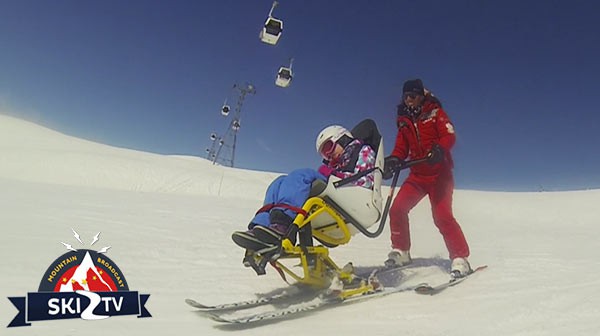Cerebral Palsy Skiing Les Arcs
31 / 03 / 2011 | Skiing with Cerebral Palsy in Arcs 1950: This was Mia’s first family ski holiday in March 2011 Mia's mother had contacted Ski 2 Freedom to find out about which ski school would be best to give her t…
Sending email...
Finding resorts...
Cerebral palsy is a condition in which there may be abnormal brain development or injury to the brain as it develops. This can occur before, during, after birth or during early childhood. This can lead to permanent disorders of the development of movement and posture, causing activity limitations. The motor disorders of cerebral palsy are often accompanied by disturbances of sensation, perception, cognition, communication and behaviour, by epilepsy and by secondary musculoskeletal problems. ‘Cerebral Palsy’ is an umbrella term that encompasses a large spectrum of disorder and therefore the level of impairment can be hugely variable.
(The above information is used courtesy of www.scope.org.uk
Images copyright ©

ESF Belle Plagne with Ludovine & Phoebe

Joshua Aspin Sit Skiing in Montgenèvre

Skiing with Cerebral Palsy in Verbier

Meet the Aspin Family

RAF family find empowerment, freedom and unity in La Plagne

Joshua Aspin skiing in Alpe d'Huez

Meet French boy Idris, 8 years old, who has Cerebral Palsy

Adaptive Archery
A person with Cerebral Palsy can enjoy the mountains with family and friends! Ski 2 Freedom has many clients who have discovered the joys of the snow and magic of the mountains. Most ski schools which have qualified instructors for disabled and adaptive skiing and snow sports should be able to work with children and adults who have mobility issues and conditions relating to Cerebral Palsy. It is also a good idea to return to the same ski resort for a couple of winters just to maintain that special relationship and new found confidence.
Your initial enquiry to the ski school should include as much background information on the skier as possible. Discussing in detail the skier’s specific needs and condition(s) is VITAL to ensure both the ski school and you know what is going to happen and to ensure you are matched with the right ski instructor and/or equipment. This may include a discussion about other associated health and social needs such as epilepsy, asthma, communication and social awareness skills and any recent medical developments. This is especially important in the case of Cerebral Palsy as the level of impairment may differ hugely between people with the same condition.
Many of the ski schools have a good idea of what is required especially when it comes to equipment and clothing, in particular the ski boots. Do ensure that you ask the ski school if they can recommend a ski hire shop for such items. Whether special ski equipment is required will depend on the degree of the disability. In cases of Cerebral Palsy where motor impairment is severe, a sit-ski or Tandemski is usually the best option. This allows a person to enjoy the exhilaration of skiing and the magic of the mountains whilst being safe in the hands of a qualified instructor who has complete control. This option also allows family and friends to all ski together.
In Europe, the US, Canada and worldwide there will be qualified ski instructors with experience in disabled and adaptive skiing tuition in most resorts, therefore it is more than likely that whichever resort you choose there will be someone who will be able to help you.
However, going somewhere where skiers with a similar condition have gone before, may well be a source of comfort and reassurance. We are delighted to be able to list below all of those schools, of which we have personal experience – but do note that there are many more we know of but just have not skied with or had clients there – for example in France there are over 150 ski schools and organisations with ski equipment and instructors!
France:
ESF Arcs 2000 ESF Belle Plagne ESF Courchevel ESF La Rosiere ESF Les Gets ESF Meribel ESF Morillon ESF Morzine ESF Tignes ESF Val d’Isere ESF Val Thorens Evolution 2 – Tignes Evolution 2 – Val d’Isere Oxygene La Plagne ZigZag International Ski School – Samoens
Switzerland
Gstaad Snowsports ESSS Château-d’Oex Active Motion – available most Swiss ski resorts Handiconcept - Villars ESSS Verbier European Snowsports Verbier
Austria
Redpoint Adaptive Ski Programme – Zem am Zillar Freizit – Schladming Ski 4 All – Zell am See
Poland
Active Therapy
If you would like information on other ski resorts please go direct to our Accessible Resort Guide or contact us.
We are delighted to be able to share information and feedback from families who ski and understand the problems associated with Cerebral Palsy or similar disorders on our Personal Stories page.
Scope - a UK based charity which supports people with disabilities and their families www.scope.org.uk
Therapy Directory www.therapy-directory.org.uk
27 Oct, 2020
After the 2020 London Marathon was postponed, and later redesigned, Ski 2 Freedom supporter and…
05 Sep, 2020
Health and wellbeing... ...the two core elements we all need to help overcome the many challenges…
16 Jul, 2020
Ski 2 Freedom’s contribution to marking the 6th Global Rare Chromosome Disorder Awareness Week from S…
08 Oct, 2020
8th October 2020 is World Sight Day! The aim of this day is to raise awareness and focus global…
30 Jul, 2020
What I set out to achieve... My acknowledgement to International Friendship Day on 30th July 2020…
16 Feb, 2020
An Inclusive, Accessible and Well-being mountain holiday! All taking place in the beautiful Haute…